Individual Case Study Report: Stress Management in Higher Education
VerifiedAdded on 2023/06/12
|7
|1483
|454
Report
AI Summary
This report, structured as a case study, investigates the impact of stress on university students' learning, health, and well-being. It explores the various stressors faced by students, including time constraints, anticipatory pressures, and situational challenges, and how these factors can negatively affect their academic performance and mental health. The report emphasizes the importance of effective stress management techniques, such as time management, identifying stress sources, and implementing the 4As of stress management (avoid, alter, adapt, and accept). It also highlights the significance of incorporating relaxation and fun activities into daily routines to mitigate stress levels and improve overall well-being. The conclusion reiterates the importance of these strategies for fostering a healthier and more productive learning environment for students in higher education, supported by references to relevant academic literature.
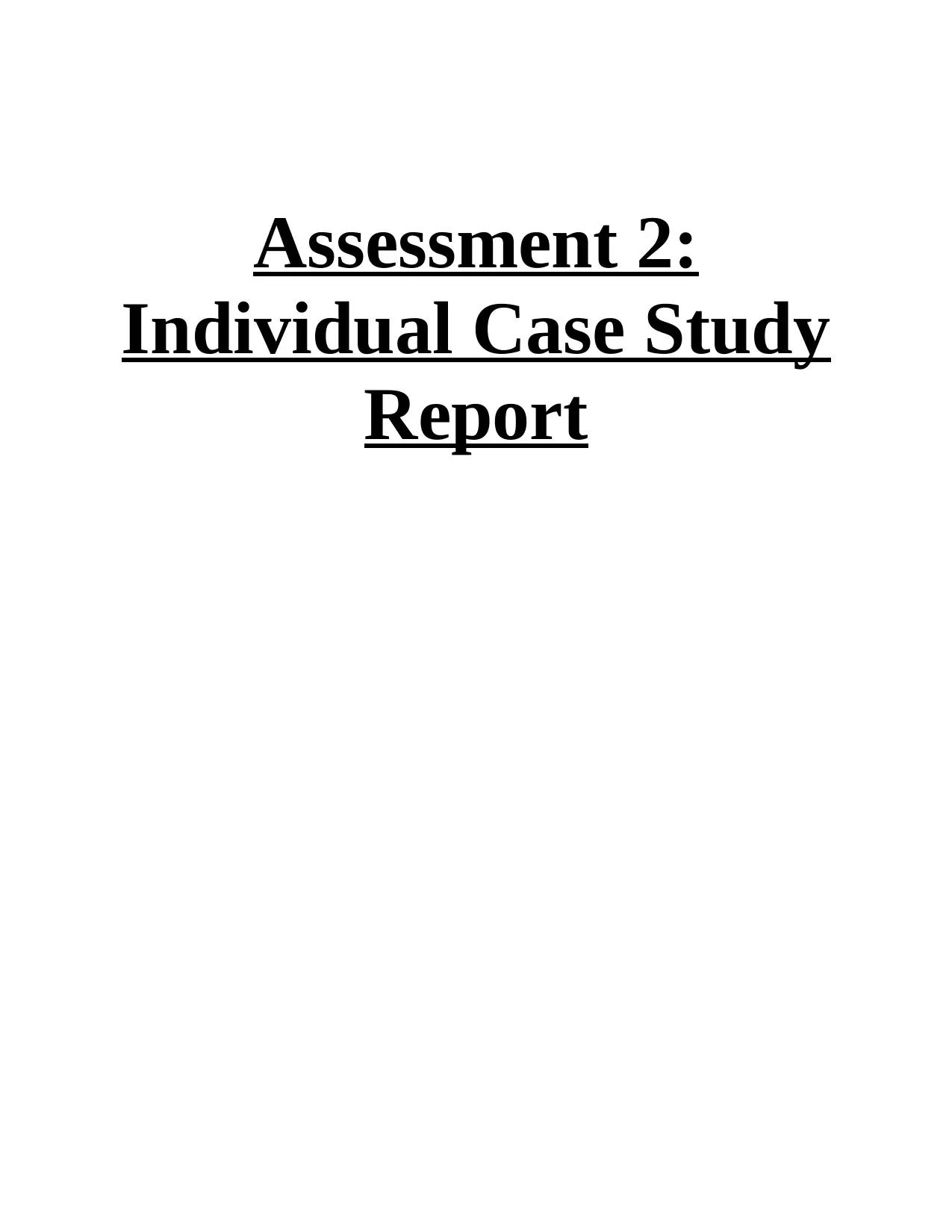
Assessment 2:
Individual Case Study
Report
Individual Case Study
Report
Paraphrase This Document
Need a fresh take? Get an instant paraphrase of this document with our AI Paraphraser
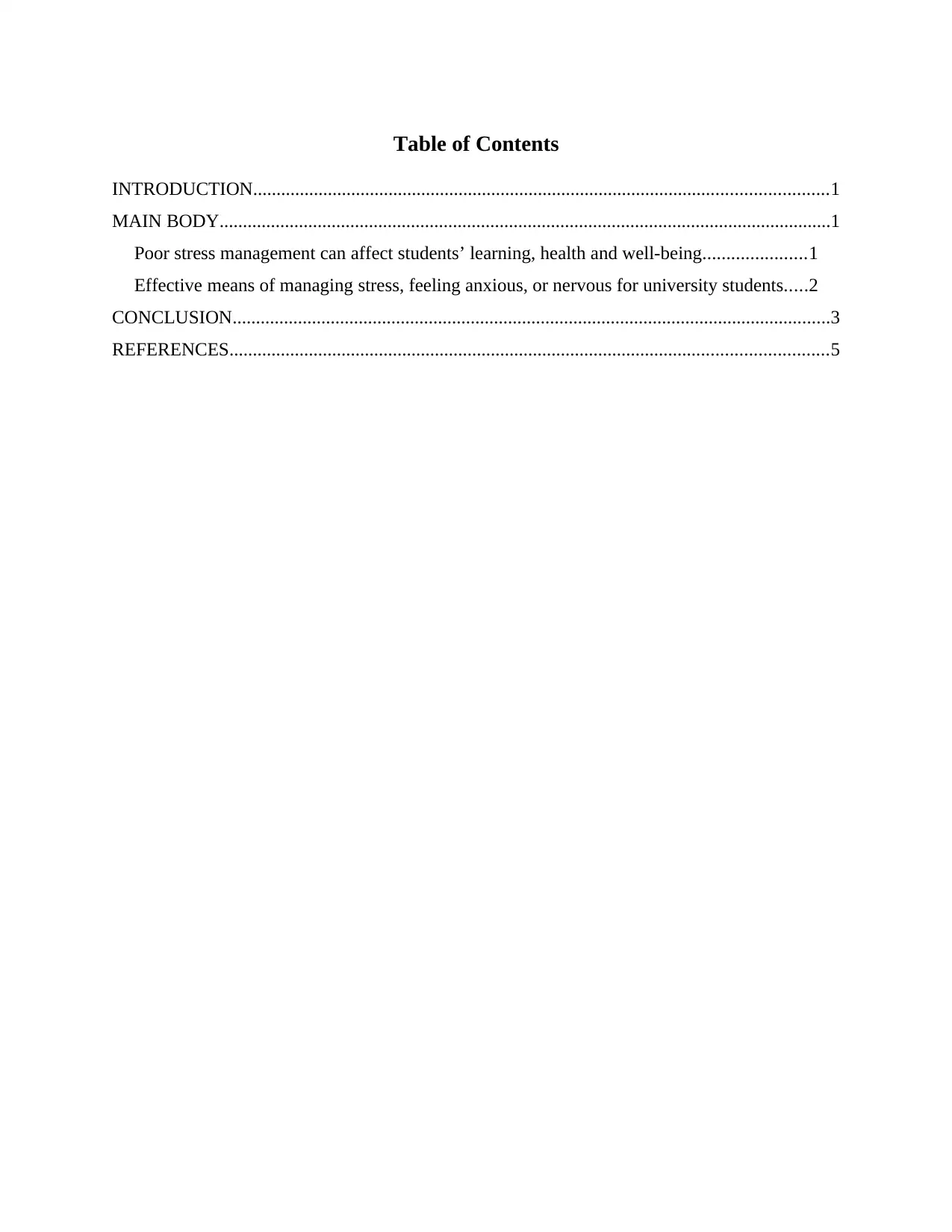
Table of Contents
INTRODUCTION...........................................................................................................................1
MAIN BODY...................................................................................................................................1
Poor stress management can affect students’ learning, health and well-being......................1
Effective means of managing stress, feeling anxious, or nervous for university students.....2
CONCLUSION................................................................................................................................3
REFERENCES................................................................................................................................5
INTRODUCTION...........................................................................................................................1
MAIN BODY...................................................................................................................................1
Poor stress management can affect students’ learning, health and well-being......................1
Effective means of managing stress, feeling anxious, or nervous for university students.....2
CONCLUSION................................................................................................................................3
REFERENCES................................................................................................................................5
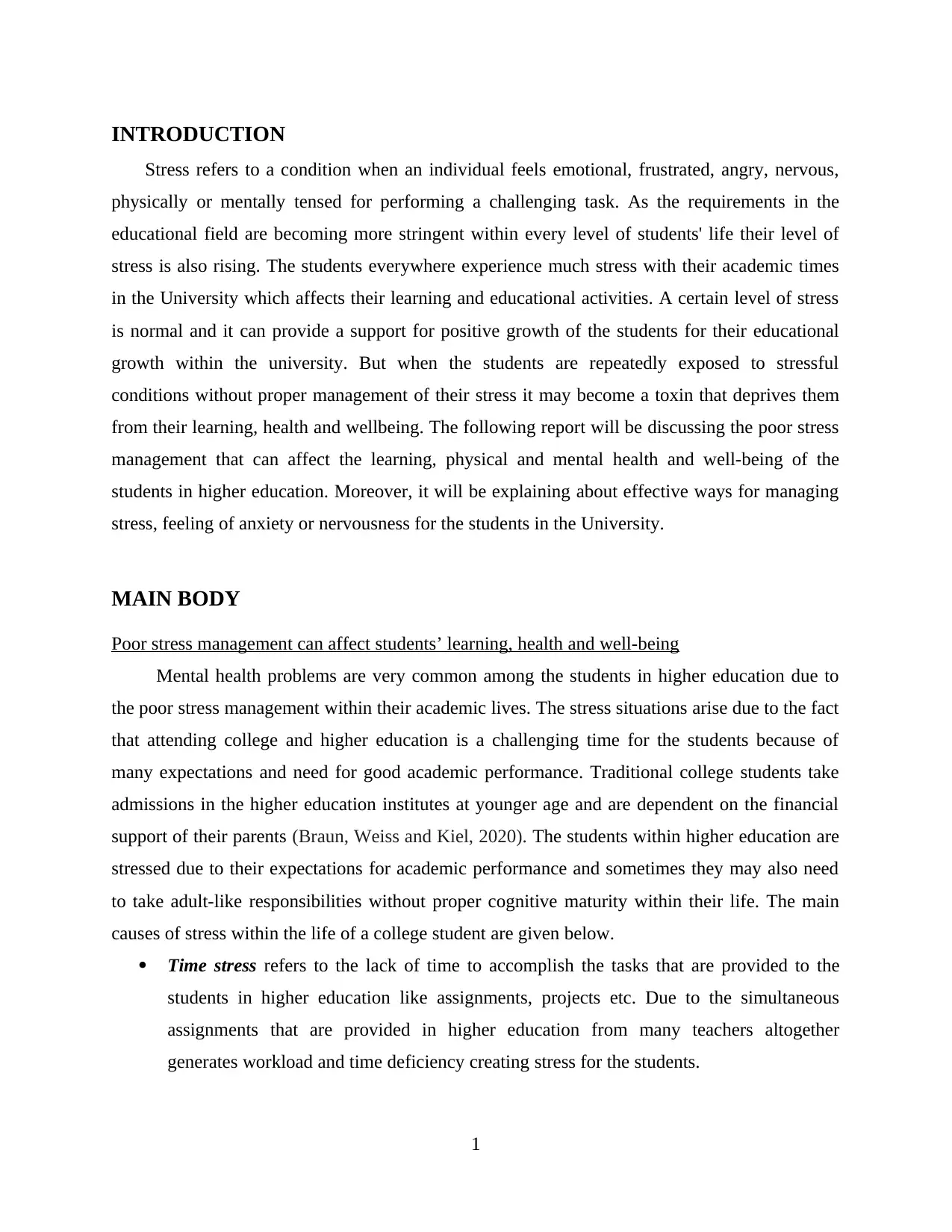
INTRODUCTION
Stress refers to a condition when an individual feels emotional, frustrated, angry, nervous,
physically or mentally tensed for performing a challenging task. As the requirements in the
educational field are becoming more stringent within every level of students' life their level of
stress is also rising. The students everywhere experience much stress with their academic times
in the University which affects their learning and educational activities. A certain level of stress
is normal and it can provide a support for positive growth of the students for their educational
growth within the university. But when the students are repeatedly exposed to stressful
conditions without proper management of their stress it may become a toxin that deprives them
from their learning, health and wellbeing. The following report will be discussing the poor stress
management that can affect the learning, physical and mental health and well-being of the
students in higher education. Moreover, it will be explaining about effective ways for managing
stress, feeling of anxiety or nervousness for the students in the University.
MAIN BODY
Poor stress management can affect students’ learning, health and well-being
Mental health problems are very common among the students in higher education due to
the poor stress management within their academic lives. The stress situations arise due to the fact
that attending college and higher education is a challenging time for the students because of
many expectations and need for good academic performance. Traditional college students take
admissions in the higher education institutes at younger age and are dependent on the financial
support of their parents (Braun, Weiss and Kiel, 2020). The students within higher education are
stressed due to their expectations for academic performance and sometimes they may also need
to take adult-like responsibilities without proper cognitive maturity within their life. The main
causes of stress within the life of a college student are given below.
Time stress refers to the lack of time to accomplish the tasks that are provided to the
students in higher education like assignments, projects etc. Due to the simultaneous
assignments that are provided in higher education from many teachers altogether
generates workload and time deficiency creating stress for the students.
1
Stress refers to a condition when an individual feels emotional, frustrated, angry, nervous,
physically or mentally tensed for performing a challenging task. As the requirements in the
educational field are becoming more stringent within every level of students' life their level of
stress is also rising. The students everywhere experience much stress with their academic times
in the University which affects their learning and educational activities. A certain level of stress
is normal and it can provide a support for positive growth of the students for their educational
growth within the university. But when the students are repeatedly exposed to stressful
conditions without proper management of their stress it may become a toxin that deprives them
from their learning, health and wellbeing. The following report will be discussing the poor stress
management that can affect the learning, physical and mental health and well-being of the
students in higher education. Moreover, it will be explaining about effective ways for managing
stress, feeling of anxiety or nervousness for the students in the University.
MAIN BODY
Poor stress management can affect students’ learning, health and well-being
Mental health problems are very common among the students in higher education due to
the poor stress management within their academic lives. The stress situations arise due to the fact
that attending college and higher education is a challenging time for the students because of
many expectations and need for good academic performance. Traditional college students take
admissions in the higher education institutes at younger age and are dependent on the financial
support of their parents (Braun, Weiss and Kiel, 2020). The students within higher education are
stressed due to their expectations for academic performance and sometimes they may also need
to take adult-like responsibilities without proper cognitive maturity within their life. The main
causes of stress within the life of a college student are given below.
Time stress refers to the lack of time to accomplish the tasks that are provided to the
students in higher education like assignments, projects etc. Due to the simultaneous
assignments that are provided in higher education from many teachers altogether
generates workload and time deficiency creating stress for the students.
1
⊘ This is a preview!⊘
Do you want full access?
Subscribe today to unlock all pages.

Trusted by 1+ million students worldwide
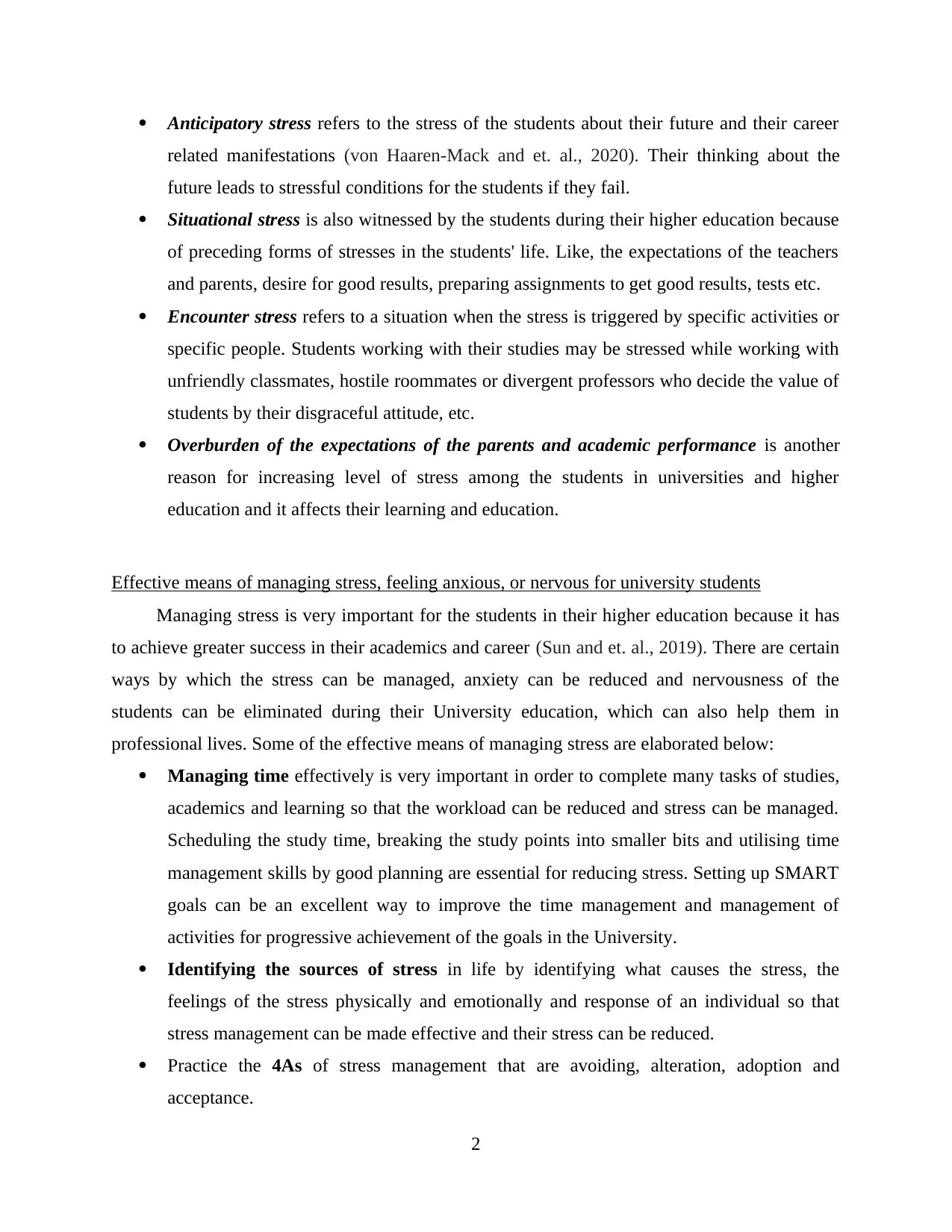
Anticipatory stress refers to the stress of the students about their future and their career
related manifestations (von Haaren-Mack and et. al., 2020). Their thinking about the
future leads to stressful conditions for the students if they fail.
Situational stress is also witnessed by the students during their higher education because
of preceding forms of stresses in the students' life. Like, the expectations of the teachers
and parents, desire for good results, preparing assignments to get good results, tests etc.
Encounter stress refers to a situation when the stress is triggered by specific activities or
specific people. Students working with their studies may be stressed while working with
unfriendly classmates, hostile roommates or divergent professors who decide the value of
students by their disgraceful attitude, etc.
Overburden of the expectations of the parents and academic performance is another
reason for increasing level of stress among the students in universities and higher
education and it affects their learning and education.
Effective means of managing stress, feeling anxious, or nervous for university students
Managing stress is very important for the students in their higher education because it has
to achieve greater success in their academics and career (Sun and et. al., 2019). There are certain
ways by which the stress can be managed, anxiety can be reduced and nervousness of the
students can be eliminated during their University education, which can also help them in
professional lives. Some of the effective means of managing stress are elaborated below:
Managing time effectively is very important in order to complete many tasks of studies,
academics and learning so that the workload can be reduced and stress can be managed.
Scheduling the study time, breaking the study points into smaller bits and utilising time
management skills by good planning are essential for reducing stress. Setting up SMART
goals can be an excellent way to improve the time management and management of
activities for progressive achievement of the goals in the University.
Identifying the sources of stress in life by identifying what causes the stress, the
feelings of the stress physically and emotionally and response of an individual so that
stress management can be made effective and their stress can be reduced.
Practice the 4As of stress management that are avoiding, alteration, adoption and
acceptance.
2
related manifestations (von Haaren-Mack and et. al., 2020). Their thinking about the
future leads to stressful conditions for the students if they fail.
Situational stress is also witnessed by the students during their higher education because
of preceding forms of stresses in the students' life. Like, the expectations of the teachers
and parents, desire for good results, preparing assignments to get good results, tests etc.
Encounter stress refers to a situation when the stress is triggered by specific activities or
specific people. Students working with their studies may be stressed while working with
unfriendly classmates, hostile roommates or divergent professors who decide the value of
students by their disgraceful attitude, etc.
Overburden of the expectations of the parents and academic performance is another
reason for increasing level of stress among the students in universities and higher
education and it affects their learning and education.
Effective means of managing stress, feeling anxious, or nervous for university students
Managing stress is very important for the students in their higher education because it has
to achieve greater success in their academics and career (Sun and et. al., 2019). There are certain
ways by which the stress can be managed, anxiety can be reduced and nervousness of the
students can be eliminated during their University education, which can also help them in
professional lives. Some of the effective means of managing stress are elaborated below:
Managing time effectively is very important in order to complete many tasks of studies,
academics and learning so that the workload can be reduced and stress can be managed.
Scheduling the study time, breaking the study points into smaller bits and utilising time
management skills by good planning are essential for reducing stress. Setting up SMART
goals can be an excellent way to improve the time management and management of
activities for progressive achievement of the goals in the University.
Identifying the sources of stress in life by identifying what causes the stress, the
feelings of the stress physically and emotionally and response of an individual so that
stress management can be made effective and their stress can be reduced.
Practice the 4As of stress management that are avoiding, alteration, adoption and
acceptance.
2
Paraphrase This Document
Need a fresh take? Get an instant paraphrase of this document with our AI Paraphraser
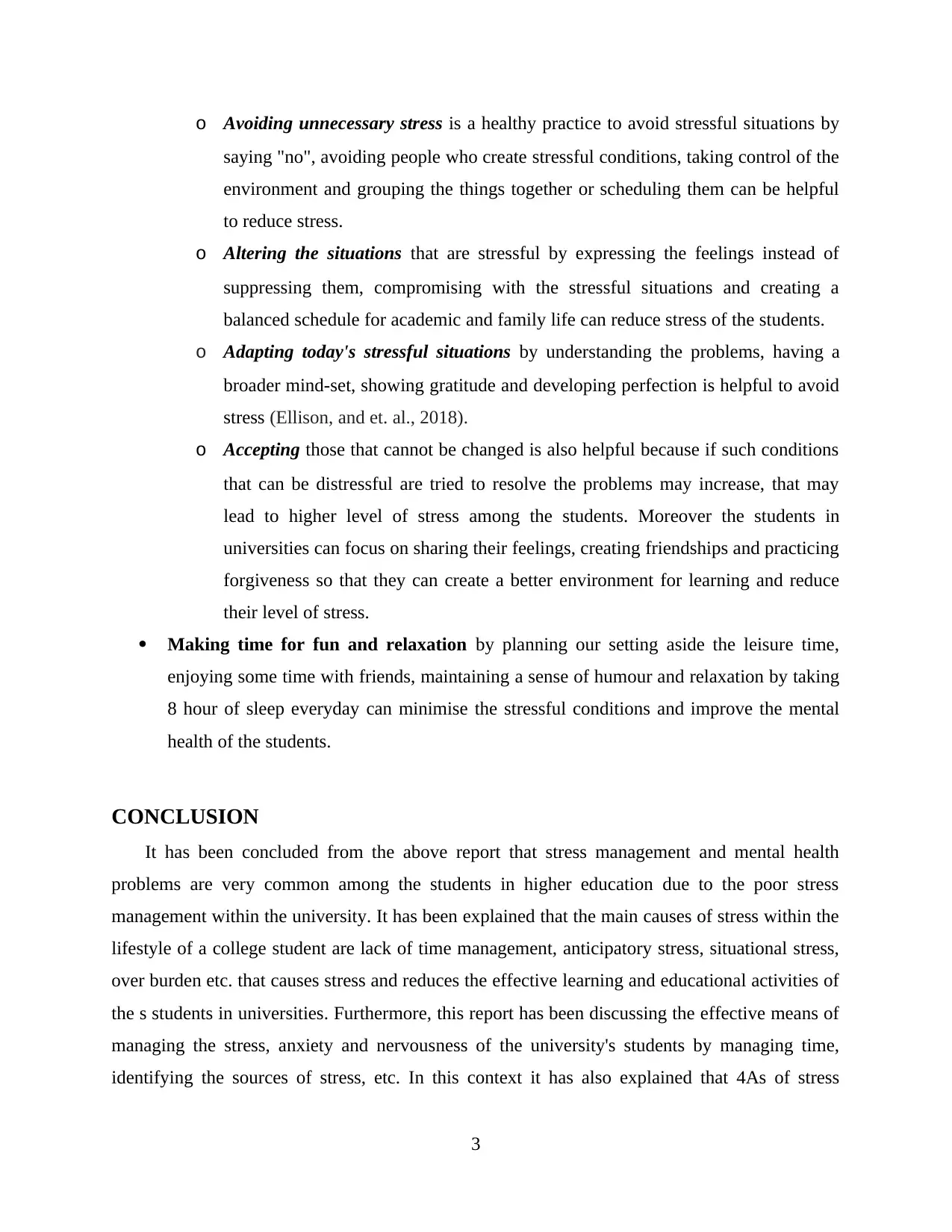
o Avoiding unnecessary stress is a healthy practice to avoid stressful situations by
saying "no", avoiding people who create stressful conditions, taking control of the
environment and grouping the things together or scheduling them can be helpful
to reduce stress.
o Altering the situations that are stressful by expressing the feelings instead of
suppressing them, compromising with the stressful situations and creating a
balanced schedule for academic and family life can reduce stress of the students.
o Adapting today's stressful situations by understanding the problems, having a
broader mind-set, showing gratitude and developing perfection is helpful to avoid
stress (Ellison, and et. al., 2018).
o Accepting those that cannot be changed is also helpful because if such conditions
that can be distressful are tried to resolve the problems may increase, that may
lead to higher level of stress among the students. Moreover the students in
universities can focus on sharing their feelings, creating friendships and practicing
forgiveness so that they can create a better environment for learning and reduce
their level of stress.
Making time for fun and relaxation by planning our setting aside the leisure time,
enjoying some time with friends, maintaining a sense of humour and relaxation by taking
8 hour of sleep everyday can minimise the stressful conditions and improve the mental
health of the students.
CONCLUSION
It has been concluded from the above report that stress management and mental health
problems are very common among the students in higher education due to the poor stress
management within the university. It has been explained that the main causes of stress within the
lifestyle of a college student are lack of time management, anticipatory stress, situational stress,
over burden etc. that causes stress and reduces the effective learning and educational activities of
the s students in universities. Furthermore, this report has been discussing the effective means of
managing the stress, anxiety and nervousness of the university's students by managing time,
identifying the sources of stress, etc. In this context it has also explained that 4As of stress
3
saying "no", avoiding people who create stressful conditions, taking control of the
environment and grouping the things together or scheduling them can be helpful
to reduce stress.
o Altering the situations that are stressful by expressing the feelings instead of
suppressing them, compromising with the stressful situations and creating a
balanced schedule for academic and family life can reduce stress of the students.
o Adapting today's stressful situations by understanding the problems, having a
broader mind-set, showing gratitude and developing perfection is helpful to avoid
stress (Ellison, and et. al., 2018).
o Accepting those that cannot be changed is also helpful because if such conditions
that can be distressful are tried to resolve the problems may increase, that may
lead to higher level of stress among the students. Moreover the students in
universities can focus on sharing their feelings, creating friendships and practicing
forgiveness so that they can create a better environment for learning and reduce
their level of stress.
Making time for fun and relaxation by planning our setting aside the leisure time,
enjoying some time with friends, maintaining a sense of humour and relaxation by taking
8 hour of sleep everyday can minimise the stressful conditions and improve the mental
health of the students.
CONCLUSION
It has been concluded from the above report that stress management and mental health
problems are very common among the students in higher education due to the poor stress
management within the university. It has been explained that the main causes of stress within the
lifestyle of a college student are lack of time management, anticipatory stress, situational stress,
over burden etc. that causes stress and reduces the effective learning and educational activities of
the s students in universities. Furthermore, this report has been discussing the effective means of
managing the stress, anxiety and nervousness of the university's students by managing time,
identifying the sources of stress, etc. In this context it has also explained that 4As of stress
3

management can be utilised to avoid, alter, adapt and accept for taking the stress conditions in
students’ life.
4
students’ life.
4
⊘ This is a preview!⊘
Do you want full access?
Subscribe today to unlock all pages.

Trusted by 1+ million students worldwide
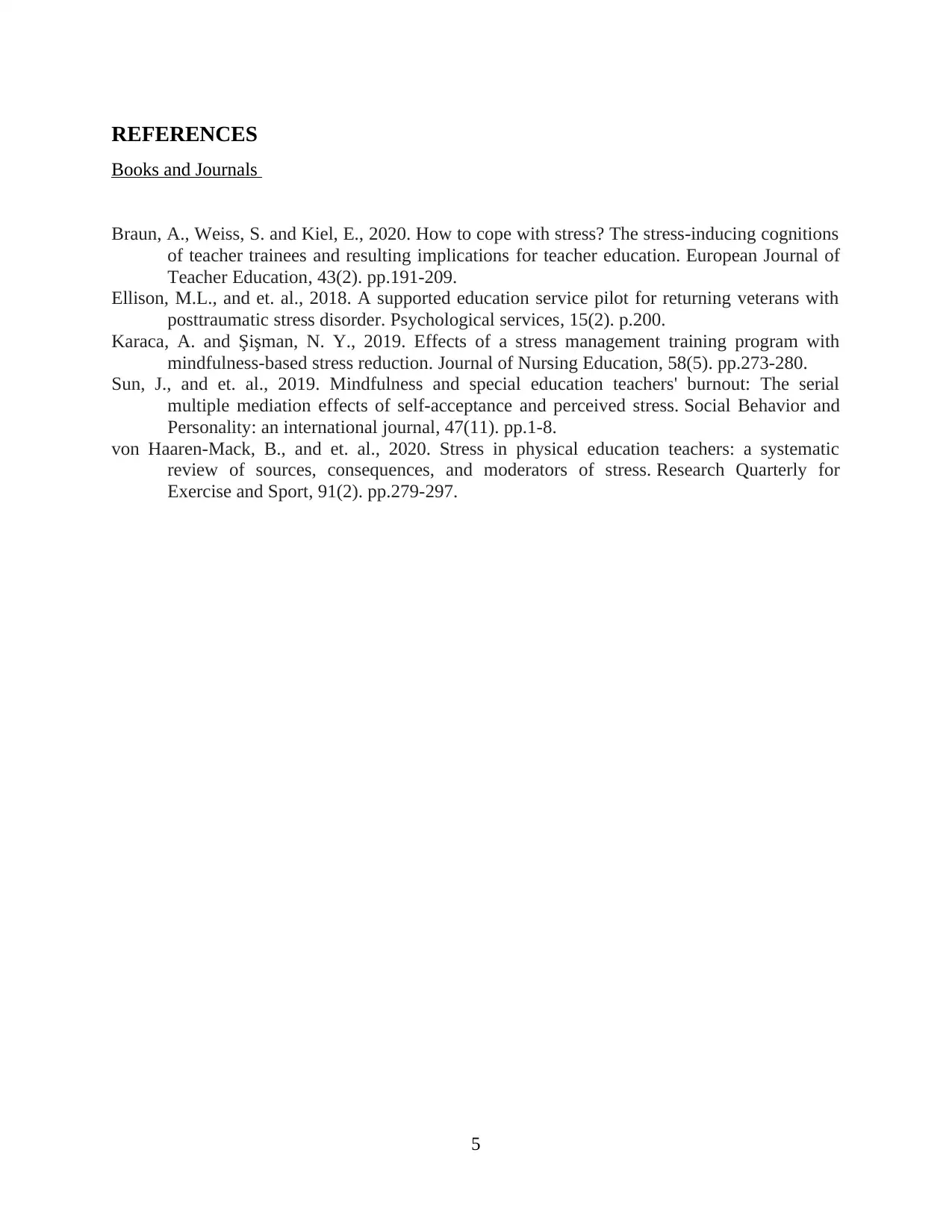
REFERENCES
Books and Journals
Braun, A., Weiss, S. and Kiel, E., 2020. How to cope with stress? The stress-inducing cognitions
of teacher trainees and resulting implications for teacher education. European Journal of
Teacher Education, 43(2). pp.191-209.
Ellison, M.L., and et. al., 2018. A supported education service pilot for returning veterans with
posttraumatic stress disorder. Psychological services, 15(2). p.200.
Karaca, A. and Şişman, N. Y., 2019. Effects of a stress management training program with
mindfulness-based stress reduction. Journal of Nursing Education, 58(5). pp.273-280.
Sun, J., and et. al., 2019. Mindfulness and special education teachers' burnout: The serial
multiple mediation effects of self-acceptance and perceived stress. Social Behavior and
Personality: an international journal, 47(11). pp.1-8.
von Haaren-Mack, B., and et. al., 2020. Stress in physical education teachers: a systematic
review of sources, consequences, and moderators of stress. Research Quarterly for
Exercise and Sport, 91(2). pp.279-297.
5
Books and Journals
Braun, A., Weiss, S. and Kiel, E., 2020. How to cope with stress? The stress-inducing cognitions
of teacher trainees and resulting implications for teacher education. European Journal of
Teacher Education, 43(2). pp.191-209.
Ellison, M.L., and et. al., 2018. A supported education service pilot for returning veterans with
posttraumatic stress disorder. Psychological services, 15(2). p.200.
Karaca, A. and Şişman, N. Y., 2019. Effects of a stress management training program with
mindfulness-based stress reduction. Journal of Nursing Education, 58(5). pp.273-280.
Sun, J., and et. al., 2019. Mindfulness and special education teachers' burnout: The serial
multiple mediation effects of self-acceptance and perceived stress. Social Behavior and
Personality: an international journal, 47(11). pp.1-8.
von Haaren-Mack, B., and et. al., 2020. Stress in physical education teachers: a systematic
review of sources, consequences, and moderators of stress. Research Quarterly for
Exercise and Sport, 91(2). pp.279-297.
5
1 out of 7